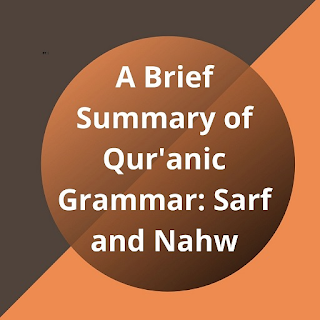Sarf and Nahw Summary: 1.4 - Verbs
Section 1.4 - Verbs
Note that, unlike the English language, Arabic does not have three tenses (past, present, and future). Instead, it has 1) a past tense called a perfect tense ماضِي and 2) present and future tense combined into one called Imperfect tense مُضارِع. Generally, all verbs are one of the following three major categories.
1. Past tense also called perfect tense (فِعْلُ الْمَاضِيُ)
2. Present and future tense also called Imperfect tense (فِعْلُ الْمُضَارِعِ).
3. Command verb also called Imperative verb (فِعْلُ الأمْرِ) for ordering. This can be both positive and negative commands such as “do it” or “don’t do it”. These could be:
- Imperative (اَلْأَمْرُ ) with and without a letter (ل) as described below.
- (نَهْيٌ ) Negative Imperative and لَا is used. Note that this is different from نَفيٌ which may also use a لَا but is a simple negative applied to verbs and nouns. The difference is that نَهِيْ when applied to imperfective tense and makes it a Jussive جَزْمِيَة and gives the meaning of imperative.
The following three verbs are always non-flexible مَبْنِيٌّ:
1) Past tense مَاضِيْ
2) ( اَلْأَمْرُ بِلَا لَامٍ) Imperative without letter لas in اَنْصُرْ meaning (you) help
3) ( اَلْأَمْرُبِهَا لَامٌ) Imperative with letter لas in لِيَنْصُرْ meaning “so that he helps”.
All other verbs are flexible مُعْرَبٌ.
1)اَلْمُضَارِع is given Indicative رَفْعٌ(default state) when it is not Subjunctive نَصْبٌand Jussive جَزَمٌ.
2) It is made Accusative نَصْبٌwith an active accusative (مَنْصُوْب)Particle as in لَا نُكَذِّبَ meaning we would not deny” or أَنْ تَبْتَغِيَ meaning “that you seek”. Here لَا and أَنْ are Accusative particles. More on this will be described later.
3) It is made Jussive when an active Jussive particle makes it a جَازِمٌ. Later نَاصِبٌ and جَازِمٌwill be mentioned in the discussion of Particles حُرُوْفٌas in لَمْ يَرَوْ meaning “they see not” or لَمْ نُمَكِّنْ meaning “we did not establish”.
Note that اَلْمُضَارِع can be subjunctive مَنْصُوْب or jussive مَجْزُوْم for other reasons also.
- The two Imperative Verb اَلْأَمْرُ and نَهْيٌ, both are always Jussive جَزَمٌ.
- The Verb can be Intransitive (فِعْلُ الَّازِمِ) or Transitive (فِعلُ الْمُتَعَدِّىْ). An Intransitive Verb does not demand/need an Object اَلْمَفعُوْل بِهٖ as in, جَاءَ وَقْتُ الصَّلَاةِmeaning the “time of prayer came”. Here وَقْتُ الصَّلَاةِ is acting as an actor فَاعِل and there in not object مَفْعُوْل. The transitive demands/requires an object مَفْعُوْل and it is of three types:
- Transitive towards a single اَلْمَفعُوْل بِهٖor Object as in ضَرَبَ meaning “he hit” requires who was hit.
- Transitive towards two Objects. For example, عَلِمَmeaning “to know” requires who knew and what, as in عَلِمْتُ زَيْدًا فَاضِلًا meaning “I came to know that Zaid is learned” and أَعْطَىٰ meaning “he gave” requires what and to whom.
- Transitive towards three Objects. For example, أَعْلَمَmeaning “to inform” requires who informed, who he informed, and about what.
۞۞۞





Comments